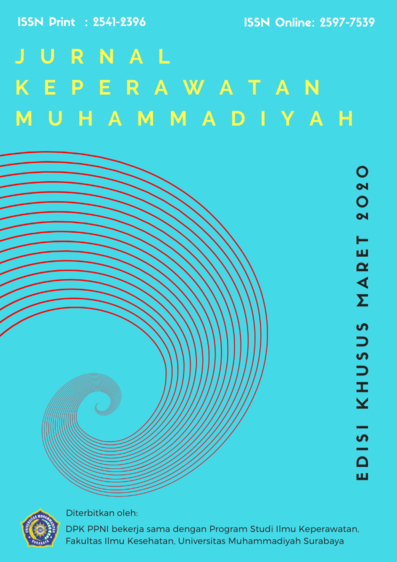Virtual Classroom Sebagai Media Pembelajaran Berbasis Android Pada Ranah Kognitif Dan Penilaian Formatif Mahasiswa Diii Kebidanan Daerah Urban Dan Sub Urban
DOI:
https://doi.org/10.30651/jkm.v5i2.4170Keywords:
virtual classroom, cognitive domain and formative assessmentAbstract
Objective: This study aims to determine the effect of virtual classroom as an Android-based learning media in the cognitive domain and formative assessment of midwifery students in urban and sub-urban areas.
Method: This type of research used in this study is a quasi-experimental design (Quasi experiment) taken with a purposive sampling technique on Midwifery Urban and Sub-urban DIII Students in December 2019 - January 2020. The effect was tested using Chi-square.
Results: The results of the analysis using the chi-squre test showed no relationship between the use of virtual classroom as an Android-based learning media in the cognitive domain and in the formative assessment of midwifery students in urban and sub-urban areas.
Conclusion: The use of virtual classroom as a medium of learning does not affect cognitive abilities and the feasibility of formative assessment.
References
Budi Eko Nur Budi. 2017. Application of Virtual Class Learning on Explanatory Text Material to Improve Activities and Indonesian Language Learning Outcomes Class X Ips 2 Senior High School 1 Students in 2017.
Journal of Social Sciences Education, Vol 27, No.2, December 2017, p-ISSN: 1412-3835; e-ISSN: 2541-4569.
Dimyati and Mudjiono. 2009. Learning and Learning. Rineka Cipta, Jakarta.
Harjanto Almio Susetyo and Sumarni Sri. 2019. Teachers' Experiences On The Use Of Google Classroom. 3rd English Language and Literature International Conference (ELLiC). ISSN: 2579-7263, ISSN: 2579-7549.
Martin Florence. 2014. Use of Synchronous Virtual Classrooms: Why, Who, and How ?. MERLOT Journal of Online Learning and Teaching Vol. 10, No. 2
Mulyadi. 2010. Educational Evaluation Development of the Model of Evaluating Religious Education in Schools. UIN-Maliki Press, Jakarta.
Safaat Nazruddin. 2014. Programming of Android-Based Smartphone and Tablet PC Applications. Informatics, Bandung.
Sohibun and Ade Filza Yulina. 2017. Development of Virtual Drive Based Learning Media Assisted by Google Drive. Journal of Teacher Training and Education Tarbiyah 02 (2) (2017) 121-129, p-ISSN: 2301-7562, e-ISSN: 2579-7964 DOI: 10.24042 / tadris.v2i2.2177.
Downloads
Published
Issue
Section
License
- Penulis tetap memegang hak atas karyanya dan memberikan hak publikasi pertama kepada jurnal ini yang secara simultan karya tersebut dilisensikan di bawah:Â Creative Commons Attribution-ShareAlike 4.0 International (CC BY-SA 4.0)













